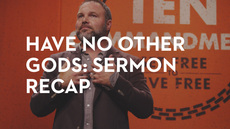With the start of the Ten Commandments sermon series I thought it might be helpful to share a few of the books I’m reading for the study. Those who have nerd tendencies (like me) should find in this blog something new to throw on the reading stack.
Books on the 10 Commandments
How Jesus Transforms the Ten Commandments
By Edmund Clowney
This is very much a devotional book. Clowney goes through each of the Ten Commandments, one per chapter, and offers whatever insights come to mind. Some examples: For the first commandment, he goes through some of the different names for God and then notes how these all apply to Jesus. For the fifth commandment he talks about “family living” and notes how the church, as the family of God, can fit into this commandment. For the eighth commandment he talks about how true treasure is that which is stored up in heaven. And for the ninth commandment, he talks about being a witness to the power of God like the apostles were in the book of Acts.
The Decalogue Through the Centuries: From The Hebrew Scriptures to Benedict XVI
Edited by Jeffery P. Greenman and Timothy Larsen
The cost of this book is easily recovered in just the first two chapters. Block’s outstanding chapter on the Decalogue in the Old Testament and Evan’s very well-done chapter on the Decalogue in the New Testament. These chapters are followed by chapters on the early church fathers, chapters devoted to Luther, Calvin, Owen, Wesley, Barth, and others.
The Truth About God: The Ten Commandments in Christian Life
By Stanley Hauerwas and William Willimon
This is a purely devotional book. Each chapter covers one commandment, and is divided up into a devotional section and an explanation/application section. Since the chapters are short they could easily be read by someone who simply wishes to read some daily thoughts about each commandment, similar to something that is a little more in length than a Daily Bread style reading.
The Ten Commandments
By Patrick D. Miller
Like Rooker (see below) this is a good introductory book on the Ten Commandments that is both exegetical and practical, though the emphasis is clearly on the application side. One of the purposes of the book is to “explore their [the Ten Commandments’] resonances and reflections in the rest of Scripture: more particularly, how each commandment is picked up in other contexts” (p. xii).
Words from the Fire: Hearing the Voice of God in the 10 Commandments
By Al Mohler
This can properly be labeled as a devotional/practical book and not an exegetical book. For instance, Mohler doesn’t look at what “in vain” meant in that day and time (third commandment), but he discusses several ways in which we are guilty of breaking this commandment.
The Ten Commandments: Ethics for the Twenty-First Century
By Mark Rooker
Of all the books on this list, Rooker’s book is one of the best. After an introduction there are ten chapters, one per commandment. Space doesn’t allow for great detail at times. With the text at just under 200 pages, some sections end up being fairly short. But Rooker interacts with Hebrew, and interacts with other bibliography (each page has an average of 2-3 footnotes). And with all the cross-references in Scripture that one could cite or discuss in any of the given commandments, Rooker confines himself to those that are more directly related to that commandment.
Written in Stone: The Ten Commandments and Today’s Moral Crisis
By Philip Ryken
As the subtitle might indicate, this is a practical devotional book. Examples and illustrations are pulled from Scripture (for the first commandment, five pages are used to look at Solomon as an example of someone who disobeyed this command). Illustrations also come from American history or church history (such as Luther or the Puritans). Usually Ryken mentions a common view on the meaning of each commandment and works though these rather quickly to get to the application.
Keeping the 10 Commandments
By J. I. Packer
This is a very short book, simple, straightforward, and easy to read. It is perhaps most helpful for those people who are just starting to study and read more theologically.
His Loving Law, Our Lasting Legacy
By Jani Ortlund
My wife Grace knows and loves Jani Ortlund and has appreciated her writing and teaching for years. In this book, the Ten Commandments are viewed in terms of how parents can teach them to their children. The book has solid gospel insights, and also very practical ways to help impress these big truths on young hearts. For parents wanting to incorporate the Ten Commandments into their child’s instruction, this is a great book.
The Law of Perfect Freedom
By Michael Horton
For years, Horton has been churning out classic reformed gospel centered resources in readable and accessible language. This book fits that mold quite well. In it he not only walks through the commandments, but also deals with important theological issues related to law and gospel. Those wanting a solid basic framework for how Reformed convictions inform study of the Ten Commandments will find this book very helpful.
Books on the Sabbath Commandment
Perhaps the most theologically debated of the Ten Commandments over the years has been the issue of the Sabbath as it pertains to Christians. For this reason, a number of books have been written on that issue including the following.
The Rest of God: Restoring Your Soul by Restoring Sabbath
By Mark Buchanan
This is a rare combination of theology and practical insight. It moves beyond theological debates about the Sabbath (though it does wade into them) and what the heart of God is for the good of his people in learning to rest in God’s grace. It is very well written and highly recommended.
From Sabbath to Lord’s Day: A Biblical, Historical, and Theological Investigation
Edited by D. A. Carson
This is a scholarly work—some chapters have well over 200 footnotes. All of the chapters are organized based on a similar structure, with the first two-thirds focusing on biblical/theological perspective and the remaining third the historical, tracing the practice of the Sabbath from the second century on through the Puritans.
Perspectives on the Sabbath: Four Views
Edited by Christopher John Donato
The four “perspectives” presented are (1) the seventh-day Sabbath (presented by what appears to be a seventh-day Adventist theologian); (2) the Christian Sabbath view (or “first-day” Sabbath), in which we are still under the Sabbath law (of the Ten Commandments) but it has been transferred to the first day; (3) Luther’s perspective of the Sabbath; and (4) “The Sabbath as Fulfilled in Christ,” that is, we are not bound by the Sabbath law anymore.
Finally, for our present series a team of writers (many of them are Mars Hill volunteers) produced a Ten Commandments Study Guide for the Community Groups at our church. The book includes 50 daily devotions, a 10-week small group study, and a 10-week inductive study. I’m very grateful for all of the work that went into creating this especially practical resource.














